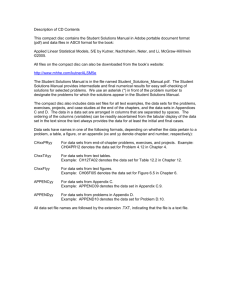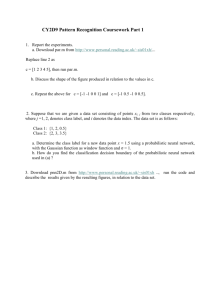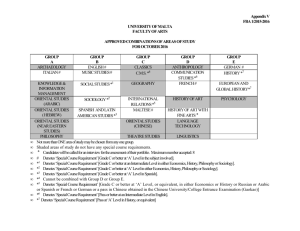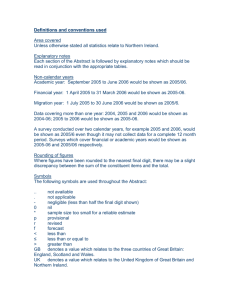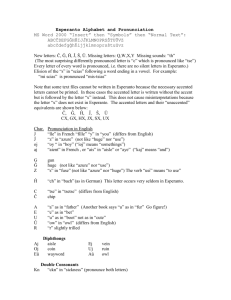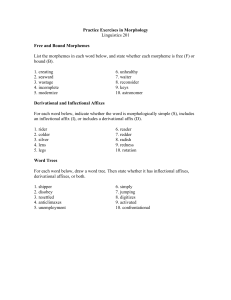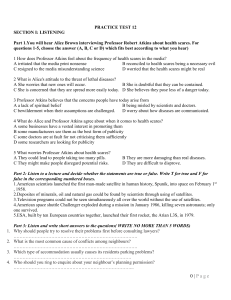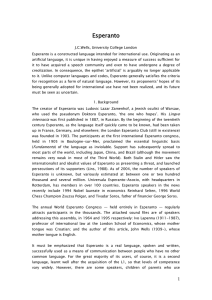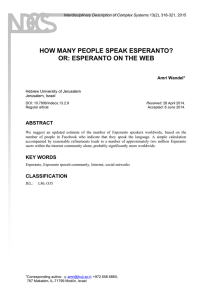Prefixes and suffixes - Esperanto-USA
advertisement
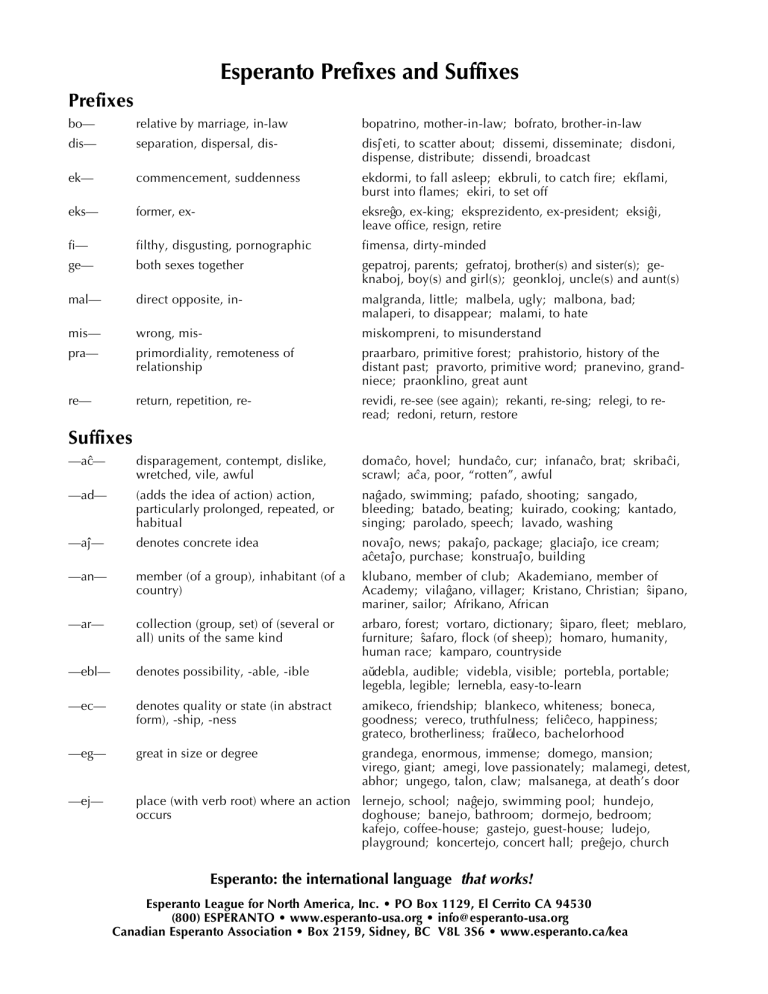
Esperanto Prefixes and Suffixes Prefixes bo— relative by marriage, in-law bopatrino, mother-in-law; bofrato, brother-in-law dis— separation, dispersal, dis- disjˆeti, to scatter about; dissemi, disseminate; disdoni, dispense, distribute; dissendi, broadcast ek— commencement, suddenness ekdormi, to fall asleep; ekbruli, to catch fire; ekflami, burst into flames; ekiri, to set off eks— former, ex- eksreĝo, ex-king; eksprezidento, ex-president; eksiĝi, leave office, resign, retire fi— filthy, disgusting, pornographic fimensa, dirty-minded ge— both sexes together gepatroj, parents; gefratoj, brother(s) and sister(s); geknaboj, boy(s) and girl(s); geonkloj, uncle(s) and aunt(s) mal— direct opposite, in- malgranda, little; malbela, ugly; malbona, bad; malaperi, to disappear; malami, to hate mis— wrong, mis- miskompreni, to misunderstand pra— primordiality, remoteness of relationship praarbaro, primitive forest; prahistorio, history of the distant past; pravorto, primitive word; pranevino, grandniece; praonklino, great aunt re— return, repetition, re- revidi, re-see (see again); rekanti, re-sing; relegi, to reread; redoni, return, restore —aĉ— disparagement, contempt, dislike, wretched, vile, awful domaĉo, hovel; hundaĉo, cur; infanaĉo, brat; skribaĉi, scrawl; aĉa, poor, “rotten”, awful —ad— (adds the idea of action) action, particularly prolonged, repeated, or habitual naĝado, swimming; pafado, shooting; sangado, bleeding; batado, beating; kuirado, cooking; kantado, singing; parolado, speech; lavado, washing —aĵ— denotes concrete idea novaĵo, news; pakaĵo, package; glaciaĵo, ice cream; aĉetaĵo, purchase; konstruaĵo, building —an— member (of a group), inhabitant (of a country) klubano, member of club; Akademiano, member of Academy; vilaĝano, villager; Kristano, Christian; ŝipano, mariner, sailor; Afrikano, African —ar— collection (group, set) of (several or all) units of the same kind arbaro, forest; vortaro, dictionary; ŝiparo, fleet; meblaro, furniture; ŝafaro, flock (of sheep); homaro, humanity, human race; kamparo, countryside —ebl— denotes possibility, -able, -ible aŭdebla, audible; videbla, visible; portebla, portable; legebla, legible; lernebla, easy-to-learn —ec— denotes quality or state (in abstract form), -ship, -ness amikeco, friendship; blankeco, whiteness; boneca, goodness; vereco, truthfulness; feliĉeco, happiness; grateco, brotherliness; fraŭleco, bachelorhood —eg— great in size or degree grandega, enormous, immense; domego, mansion; virego, giant; amegi, love passionately; malamegi, detest, abhor; ungego, talon, claw; malsanega, at death’s door —ej— place (with verb root) where an action lernejo, school; naĝejo, swimming pool; hundejo, occurs doghouse; banejo, bathroom; dormejo, bedroom; kafejo, coffee-house; gastejo, guest-house; ludejo, playground; koncertejo, concert hall; preĝejo, church Suffixes Esperanto: the international language that works! Esperanto League for North America, Inc. • PO Box 1129, El Cerrito CA 94530 (800) ESPERANTO • www.esperanto-usa.org • info@esperanto-usa.org Canadian Esperanto Association • Box 2159, Sidney, BC V8L 3S6 • www.esperanto.ca/kea —em— denotes an inclination, bent, bias, proclivity, leaning, -full parolema, talkative; ludema, playful; timema, fearful; mortema, mortal; pardonema, merciful —end— which-must-be-done solvenda problemo, problem which must be solved; farenda laboro, work that must be done; legenda, must be read; lavenda, must be washed —er— denotes element or unit of homogeneous whole monero, coin; pluvero, rain drop; panero, crumb; ĉenero, link; herbero, blade of grass; semero, seed of grain; neĝero, snowflake; akvero, drop of water —estr— leader, head, “boss”, ruler, commander, chief hotelestro, hotel manager; estraro, leadership (governing body); ŝipestro, captain; familiestro, head of the family; imperiestro, emperor; staciestro, station master —et— dimunitive; weakens the idea of the root to a high degree dometo, cottage; dormeti, to doze, nap; vojeti, path; ruldometo, trailer (camper); ŝipeto, boat; ŝtoneto, pebble; rideti, to smile; blueta, bluish —id— offspring of living creatures hundido, puppy; katido, kitten; arbido, seedling; bovido, calf; ŝafido, lamb; musido, baby mouse; reĝido, prince; Israelido, Israelite —ig— make, cause to be, render, -ify blankigi, bleach, whiten; akridi, to sharpen; klarigi, clarify, explain; purigi, to clean; nuligi, to nullify, cancel, void; boligi, to (cause to) boil —iĝ— become, come to be, get, grow, turn malsekiĝi, to become wet; malpuriĝi, to become dirty; paliĝi, to grow pale; amikiĝi, to become friends; aniĝi, to join (a club, society); naskiĝi, to be born —il— object used to perform an action, appliance, tool, implement, instrument skribili, anything used for writing; hakilo, axe; ludilo, toy; fotilo, camera; tranĉilo, knife; muzikilo, musical instrument; kudrilo, needle —in— denotes female, feminine patrino, mother; onklino, aunt; fratino, sister; bovino, cow; porkino, sow; edzino, wife; skoltino, girl scout; ĉevalino, mare; amikino, female friend —ind— worthy of, deserving of fidinda, trustworthy; admirinda, admirable; lerninda, worth learning; leginda, worth reading; aminda, lovable; laŭdinda, praiseworthy; memorinda, memorable —ing— holder for one object (sheath, socket, stand) kandelingo, candlestick; glavingo, scabbard; ovingo, egg cup; plumingo, pen holder; rozingo, bud vase —ism— doctrine, movement, theory, system,ism Platonismo, Platonism; alkoholismo, alcoholism; imperiismo, imperialism; optimismo, optimism; turismo, turism; Budhismo, Buddhism —ist— person connected with the root, usually by profession (business, calling, vocation, habitual interest) dentisto, dentist; marksisto, Marxist; instruisto, teacher; floristo, florist; muzikisto, musician; maristo, sailor; aferisto, businessman; poŝtisto, postal worker; (leter)portisto, (letter) carrier —obl— denotes multiplication, -ple duobla, twofold; triobla, triple; multobla, manifold —on— denotes fraction, -th duono, half; kvarono, quarter; du trionoj, 2/3; dekono, tenth; sep okonoj, 7/8; dekonaĵo, tithe —op— collective numeral (number of elements together, in a group) unuope, one at a time; duope, in twos (pairs), two by two; triope, in threes, three by three —uj— container, receptacle, holder (also countries) inkujo, inkwell; monujo, purse; ĉapelujo, hatbox; Italujo, Italy (holds Italians); abelujo, beehive —ul— denotes individual (person) junulo, youth; drinkulo, drunkard; maljunulino, an old woman; sanktulo, saint; bonulo, a good person —um— no definite meaning: sense is defined malvarmumo, a cold; manumo, cuff; krucumi, to by usage or context crucify; plenumi, to fulfill, perform; okulumi, to ogle —ĉj—, —nj— affectionate endings patro, father: paĉjo, daddy; panjo, mom; Roberto, Roĉjo, “Bob”; Vilĉjo, “Bill”

